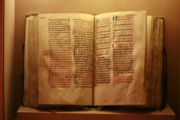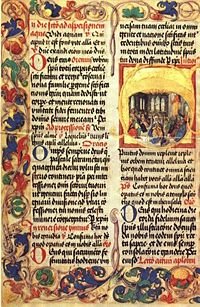.gif)
Rubric (typography)
Encyclopedia


Red
Red is any of a number of similar colors evoked by light consisting predominantly of the longest wavelengths of light discernible by the human eye, in the wavelength range of roughly 630–740 nm. Longer wavelengths than this are called infrared , and cannot be seen by the naked eye...
ink to highlight it. The word derives from the , meaning red ochre or red chalk
Chalk
Chalk is a soft, white, porous sedimentary rock, a form of limestone composed of the mineral calcite. Calcite is calcium carbonate or CaCO3. It forms under reasonably deep marine conditions from the gradual accumulation of minute calcite plates shed from micro-organisms called coccolithophores....
, and originates in Medieval illuminated manuscript
Illuminated manuscript
An illuminated manuscript is a manuscript in which the text is supplemented by the addition of decoration, such as decorated initials, borders and miniature illustrations...
s from the 13th century or earlier. In these, red letters were used to highlight initial capitals (particularly of psalms
Psalms
The Book of Psalms , commonly referred to simply as Psalms, is a book of the Hebrew Bible and the Christian Bible...
), section headings and names of religious significance, a practice known as rubrication
Rubrication
Rubrication was one of several steps in the medieval process of manuscript making. Practitioners of rubrication, so-called rubricators, were specialized scribes who received text from the manuscript's original scribe and supplemented it with additional text in red ink for emphasis...
, which was a separate stage in the production of a manuscript
Manuscript
A manuscript or handwrite is written information that has been manually created by someone or some people, such as a hand-written letter, as opposed to being printed or reproduced some other way...
.
Rubric can also mean the red ink or paint used to make rubrics, or the pigment
Pigment
A pigment is a material that changes the color of reflected or transmitted light as the result of wavelength-selective absorption. This physical process differs from fluorescence, phosphorescence, and other forms of luminescence, in which a material emits light.Many materials selectively absorb...
used to make it. Although red was most often used, other colours came into use from the late Middle Ages
Middle Ages
The Middle Ages is a periodization of European history from the 5th century to the 15th century. The Middle Ages follows the fall of the Western Roman Empire in 476 and precedes the Early Modern Era. It is the middle period of a three-period division of Western history: Classic, Medieval and Modern...
onwards, and the word rubric was used for these also.
Various figurative senses of the word have been extended from its original sense. Usually these senses are used within the set phrase "under [whatever] rubric", for example, "under this rubric, [X is true]" or "[X was done] under the rubric of Y." These senses are defined in part by Merriam-Webster's Collegiate as follows: "an authoritative rule"; "the title of a statute"; "something under which a thing is classed : CATEGORY"; "an explanatory or introductory commentary : GLOSS"; "an established rule, tradition, or custom"; "a guide listing specific criteria for grading or scoring academic [assignments]
Rubric (academic)
A rubric is an assessment tool for communicating expectations of quality. Rubrics support student self-reflection and self-assessment as well as communication between assessor and assessees...
". (See Merriam-Webster's Collegiate for the full listing.)
Instructions in liturgical contexts
Instructions for a priest explaining what he had to do during a liturgicalLiturgy
Liturgy is either the customary public worship done by a specific religious group, according to its particular traditions or a more precise term that distinguishes between those religious groups who believe their ritual requires the "people" to do the "work" of responding to the priest, and those...
service were also rubricated in missal
Missal
A missal is a liturgical book containing all instructions and texts necessary for the celebration of Mass throughout the year.-History:Before the compilation of such books, several books were used when celebrating Mass...
s and the other forms of service book, leaving the sections to be spoken aloud in black. From this, rubric has a second meaning of an instruction in a text, regardless of how it is written or printed. This is in fact the oldest recorded meaning in English,found in 1375. Less formally, rubrics may refer to any liturgical action customarily performed over the course of a service, whether or not they are actually written down.
The history, status and authority of the content of rubrics is a matter of significance, and sometimes controversy, among scholars of liturgy. In the past, some theologians attempted to distinguish between those rubrics they considered to be of divine origin, and those merely of human origin. Rubrics were probably originally verbal, and then written down in separate volumes. The earliest service books to survive do not contain them, but from references in writings of the first millennium it appears that written versions existed. Full rubrics covering matters such as the vestment
Vestment
Vestments are liturgical garments and articles associated primarily with the Christian religion, especially among Latin Rite and other Catholics, Eastern Orthodox, Anglicans, and Lutherans...
s to be worn, the appearance of the altar
Altar
An altar is any structure upon which offerings such as sacrifices are made for religious purposes. Altars are usually found at shrines, and they can be located in temples, churches and other places of worship...
, when to hold particular services and similar matters may still be published separately. In modern service books like the Roman Missal
Roman Missal
The Roman Missal is the liturgical book that contains the texts and rubrics for the celebration of the Mass in the Roman Rite of the Catholic Church.-Situation before the Council of Trent:...
, lengthy general rubrics (probably printed in the normal black) cover such issues, and preface the actual orders of service, which contain shorter basic rubrics for the conduct of the service, still usually printed in red. Red is also often used to distinguish between words to be spoken by the celebrant and the congregation, or by other specific people involved in a service (people being married for example).
After the development of printing

Printing
Printing is a process for reproducing text and image, typically with ink on paper using a printing press. It is often carried out as a large-scale industrial process, and is an essential part of publishing and transaction printing....
, other typographic effects such as italic type
Italic type
In typography, italic type is a cursive typeface based on a stylized form of calligraphic handwriting. Owing to the influence from calligraphy, such typefaces often slant slightly to the right. Different glyph shapes from roman type are also usually used—another influence from calligraphy...
, or using a bold, or different size type, became used for emphasizing a section of text, and as printing in two colours is more expensive and time consuming, red rubrics have since tended to be reserved specifically for religious service books, luxury editions, or books where design is emphasized.
William Morris
William Morris
William Morris 24 March 18343 October 1896 was an English textile designer, artist, writer, and socialist associated with the Pre-Raphaelite Brotherhood and the English Arts and Crafts Movement...
's medieval-inspired typography for the Kelmscott Press at the end of the 19th century included chapter titles and other accents in red (or rarely blue) ink, and was influential on small press
Small press
Small press is a term often used to describe publishers with annual sales below a certain level. Commonly, in the United States, this is set at $50 million, after returns and discounts...
art typography associated with the Arts and Crafts movement
Arts and Crafts movement
Arts and Crafts was an international design philosophy that originated in England and flourished between 1860 and 1910 , continuing its influence until the 1930s...
in both England
England
England is a country that is part of the United Kingdom. It shares land borders with Scotland to the north and Wales to the west; the Irish Sea is to the north west, the Celtic Sea to the south west, with the North Sea to the east and the English Channel to the south separating it from continental...
and the United States
United States
The United States of America is a federal constitutional republic comprising fifty states and a federal district...
, particularly the work of the Ashendene
Ashendene Press
The Ashendene Press was a small private press founded by Charles Henry St John Hornby . It operated from 1895 to 1915 in Chelsea, England, and was revived after the war in 1920...
, Doves
Doves Press
Doves Press was a private press based in Hammersmith, London. It was founded by T. J. Cobden Sanderson before 1900 when he asked Sir Emery Walker to join him . Cobden Sanderson commissioned the press's type, which was drawn under Walker's supervision, and set up the Doves Bindery to bind the books...
, and Roycroft
Roycroft
Roycroft was a reformist community of craft workers and artists which formed part of the Arts and Crafts movement in the USA. Elbert Hubbard founded the community in 1895 in the village of East Aurora, Erie County, New York, near Buffalo. Participants were known as Roycrofters...
presses.
Around 1900, red rubrics were incorporated into a Red letter edition
Red letter edition
The term red letter edition is used to describe Bibles in which words spoken by Jesus, commonly only while he was on the Earth, are printed in red ink...
of the King James translation of the Bible to distinguish the words spoken by Jesus during his mortal ministry, that translation lacking quotation marks. Other versions of the bible have since adopted the popular practice.
External links
- Rubrics of the Anglican Low Mass (from 1931) Very full set of rubrics (more than a normal service book would include); perversely, the words to be spoken are here shown in red, and the rubrics in black.
- Catholic Order of Mass Rubrics showing who speaks are in red; others in small italics.
- Kelmscott Press Examples of Kelmscott Press pages showing use of red accents.
- So this then is the preachment entitled Chicago tongue A "flip book" presentation of the Roycroft Press edition c. 1913, illustrating use of rubrics in the Arts and Crafts tradition.
- Good Recipes This cookbookCookbookA cookbook is a kitchen reference that typically contains a collection of recipes. Modern versions may also include colorful illustrations and advice on purchasing quality ingredients or making substitutions...
published by the Woman's Society of the Winnetka Congregational Church in 1906 shows the influence of Arts and Crafts rubrics on everyday typography in the early 20th century.

